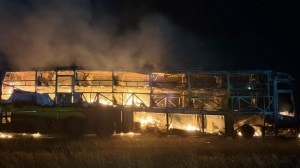Village falls off map, waiting for `killers’ from neighbourhood
KHERKHADA (KARAULI, RAJASTHAN), MAY 21: This village must have fallen of the maps of civilizations long ago. At the foot of a hill, a few ...

KHERKHADA (KARAULI, RAJASTHAN), MAY 21: This village must have fallen of the maps of civilizations long ago. At the foot of a hill, a few kilometres off the state highway, lies Hatyaron ka Kherkhada — the village of murderers.
Folklore has it that Kherkhada was founded by murderers and their families. The villagers deny it. But the fact is, it is still is the only refuge for those excommunicated from the neighbouring villages.
Villagers prefer to call this Jagarwalon Ka Kherkhada, after the Jagar clan of the Meena tribal community and claim they are descendants of a common ancestor who was ousted from his community, centuries ago, for murder.
They say they remain ostracised from the community for their ancestor’s crime. “We do not allow any killer in our village. How do people say ourvillage is a refuge of killers?,” says Nemi Chand Meena, one of the most vocal of the villagers.
Few outside agree that the only murderer in the village was the one declared an outcaste over a 1,000 years ago. “Many went (to Kherkhada) as there was nowhere else to go earlier. Now they go and settle down anywhere,” said president of Meena Samaj and local Congress leader, Avtar Narayan Meena.
Neighbouring villagers say they have never been to Kherkhada. They even refuse to say where the village is. Not surprising, for they would be banished from their village, according to the custom which is applied more rigorously than law.
Consisting of 28 villages of different clans of Scheduled Tribe Meena community, this is the domain of the Atthaisa Panchayat (assembly of 28 villages). Those declared excommunicated by this panchayat have to get out of the area, outside the 28 villages. And anyone found guilty of maintaining contact with him would face the same punishment. If the family leaves withthe condemned person, the family and its descendants are excommunicated — for all time to come.
This punishment is only for murder of a kin, though here it means anyone from a village in this area. A pujari, for instance, was thrown out for murdering a carpenter. The condemned man’s land and property, unless the family also gives him up and stays back to use it, simply wastes away. Thedescendants cannot come back to claim it.
A Delhi Police head constable is trying to do it now, according to a lawyer in nearby Hindaun City, Net Ram Meena. The policeman’s father, Jairam, was accused of killing a man of Todupura village. His family left with him, forfeiting the property. Now the head constable has moved the local court for restoration of his family property. This, in fact, is the first challenge that the panchayat has ever faced.
Usually, the suspects leave even before the trial by the panchayat, as in the case of Jairam. If he doesn’t, and his family does not ask him to go away, the village panchayat convenes and tries him. The next appeal isto the panchayat of 12 and the final court is the Atthaisa Panchayat. Its verdict is supreme and those convicted by the panchayat has to face excommunication even if the courts of law acquit him, as in the case of Maluka Meena, ousted from Mothiapura, who was accused of killing his uncle. The accused has to undergo the panchayat’s punishment even if he has served the sentence, as Jairam did.
They have to go, leaving their home and hearth and all their property. Bhullan and his brother Chhuttan had to leave Palanpura for killing their uncle, who was also the nephew of Meena Samaj president Avtar NarayanMeena, over property dispute. According to Bhullan, they had 30 bighas of land and a four-storeyed house in their ancestral village. Now, he lives in athatched, one-room hutment, his children, still toddlers, do not get any education and have hardly enough to eat.
The custom lives on even in the 21st century with no one challenging it. The panchayat decides the fate of the accused. So most of them head towards a village they’d never wanted to go to, the only place left for them — Kherkhada.
Photos



- 01
- 02
- 03
- 04
- 05



























